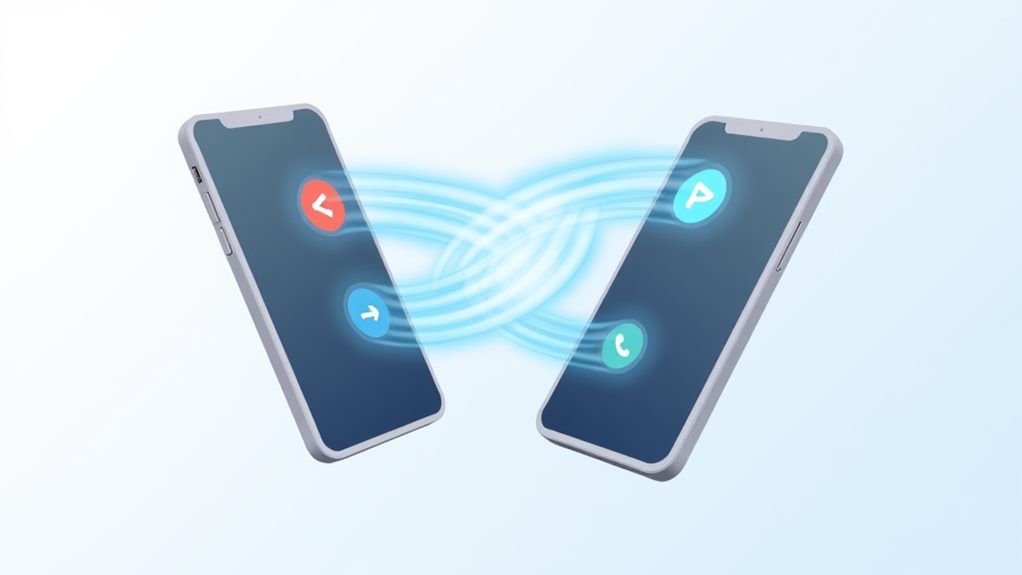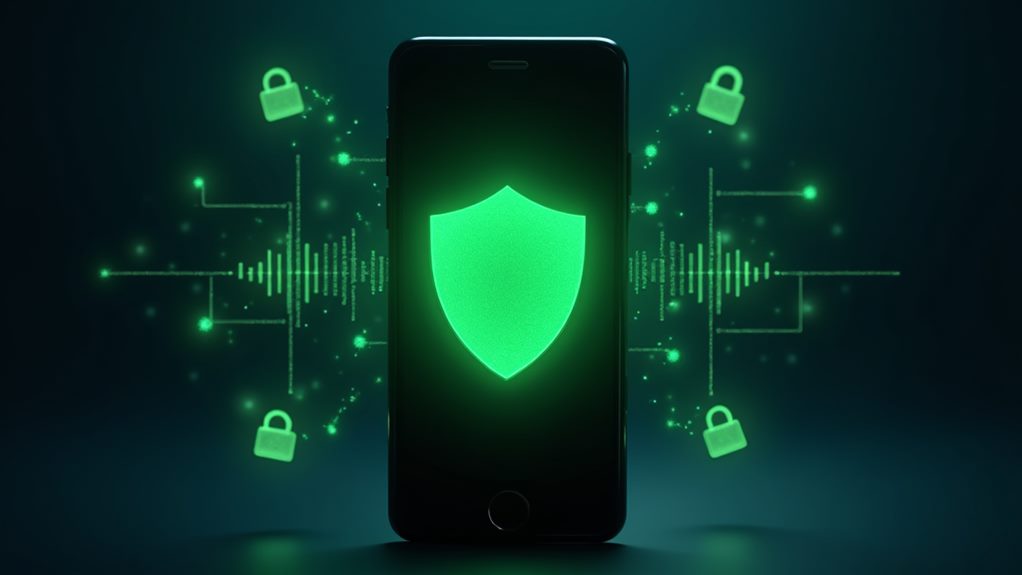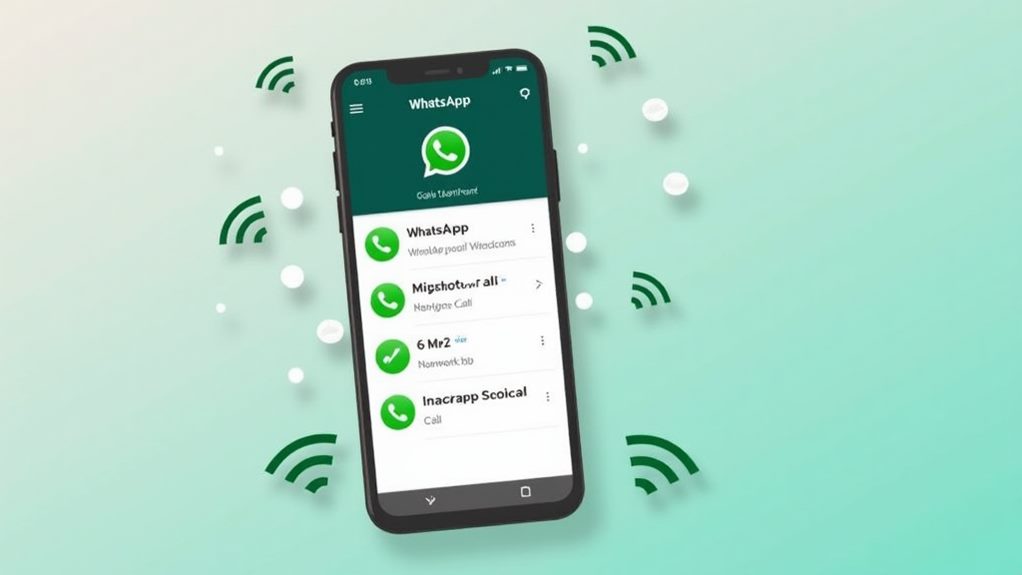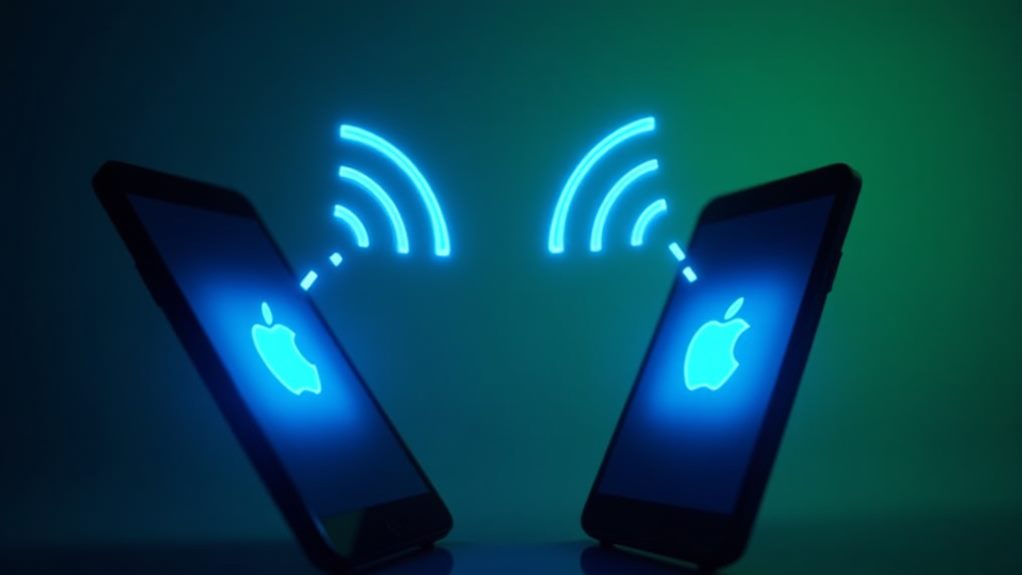WhatsApp operates as a VoIP (Voice over Internet Protocol) service that converts your voice and video signals into digital data for transmission over the internet. You'll find it enables free calls through Wi-Fi or mobile data, supporting up to 32 participants in group communications. The platform implements end-to-end encryption protocols to secure your conversations, while integrating text messaging, file sharing, and video conferencing capabilities. You'll need to verify your number through SMS or voice call authentication to activate the VoIP features. The system's continuous evolution introduces enhanced functionalities and AI-powered capabilities that transform modern communication standards.
Understanding WhatsApp VoIP Technology

Is Whatsapp a Voip Service?
Understanding WhatsApp VoIP Technology
WhatsApp's implementation of Voice over Internet Protocol represents a fundamental shift in telecommunications technology. When you're using WhatsApp's VoIP features, you're leveraging a sophisticated system that transforms your voice and video signals into digital data, transmitting them through the internet rather than traditional phone networks. This integration allows you to connect with fellow users worldwide while only requiring a stable internet connection.
Additionally, WhatsApp guarantees high-quality voice and video calls, guaranteeing a positive user experience. The end-to-end encryption not only protects your conversations but also reinforces the app's reliability as a secure communication tool.
The VoIP technology in WhatsApp isn't just about making calls; it's an all-encompassing communication solution that's seamlessly woven into the messaging application. You'll notice how effortlessly you can switch between text conversations and voice or video calls within the same interface.
What sets WhatsApp's VoIP apart is its robust security framework, featuring end-to-end encryption that guarantees your calls remain private and protected from unauthorized access.
When you're organizing group discussions, WhatsApp's VoIP system supports up to 32 participants in a single call, making it an effective platform for both personal and professional communication.
This capability, combined with the app's internet-based protocol, enables you to collaborate globally without concerns about traditional long-distance charges.
Key Features of WhatsApp Calling
Anyone familiar with modern communication platforms will recognize the robust feature set that defines WhatsApp's calling system. Leveraging VoIP technology, you'll find that WhatsApp calls enable you to make free voice calls and video connections worldwide, directly through your internet connection.
Similar to Google Voice features, your communication experience is enhanced by WhatsApp's extensive security measures, as every call benefits from end-to-end encryption, ensuring your conversations remain secure and private. You'll appreciate the platform's versatility, allowing up to 32 participants in group calls – perfect for your virtual meetings or family gatherings.
When you're using WhatsApp calls, you can smoothly shift between voice and video modes without interrupting your connection.
What sets WhatsApp apart is its cross-platform compatibility. You're able to make voice and video calls seamlessly across your devices, whether you're using smartphones, tablets, or computers.
This flexibility means you're always connected to your network, regardless of your preferred device. The integration of these features creates a unified communication system that's both accessible and reliable, making WhatsApp a sophisticated VoIP service that meets your modern communication needs.
WhatsApp VoIP Security Measures

WhatsApp operates at the forefront of communication security, implementing a sophisticated array of VoIP security protocols that protect your calls through end-to-end encryption. This means that even the VoIP calls via WhatsApp are secured against potential interception, providing yet another layer of protection for your conversations.
When you make WhatsApp VoIP calls, your conversations remain strictly between you and your intended recipients, making it a trustworthy platform for sensitive business communication.
As a VoIP service provider, WhatsApp continuously strengthens its security measures through regular updates and security patches. You'll need to keep your app updated to maintain these protections against emerging threats.
The platform's robust security framework guarantees your user data stays protected, but it's vital to remember that your device's security plays an important role in maintaining this protection.
To maximize your security when using WhatsApp VoIP calls, you should enable two-step verification on your account. This additional layer prevents unauthorized access and reinforces your communication privacy.
The platform's security protocols work seamlessly in the background, allowing you to focus on your conversations while maintaining professional-grade protection. As part of the WhatsApp community, you're benefiting from some of the most advanced security measures available in modern communication technology.
Additionally, it's worth noting that VoIP security risks can still exist, but WhatsApp's protective features greatly mitigate these concerns.
Business Benefits of WhatsApp VoIP
Numerous businesses worldwide are leveraging WhatsApp's VoIP capabilities to revolutionize their communication protocols and reduce operational costs. When you implement a WhatsApp VoIP number into your business tools, you'll gain access to free international calls over Wi-Fi, enabling significant cost savings that you can redirect to other operational needs.
You'll find that WhatsApp's call feature delivers exceptional audio quality while connecting you to over 2 billion potential customers globally. The platform's robust video conferencing capabilities support up to 32 participants in group calling features, making it an ideal solution for your remote team collaborations and client meetings.
You're able to maintain seamless integration between various communication needs, as WhatsApp combines voice, video, messaging, and file sharing in one unified platform.
Your customer engagement metrics can improve dramatically, with message open rates reaching 98%. You'll experience enhanced customer support capabilities through real-time responses, strengthening your client relationships.
Setting Up WhatsApp VoIP

To set up WhatsApp VoIP, you'll need to download the WhatsApp application and secure a VoIP number from a reliable service provider that supports SMS or call verification.
The verification process requires you to input your country code and VoIP number into WhatsApp, which then initiates an SMS verification sequence to authenticate your account.
If SMS verification isn't successful, you can opt for a voice call verification where an automated system will provide you with the necessary verification code to complete your WhatsApp VoIP setup.
Initial Setup Requirements
Setting up WhatsApp's VoIP functionality requires specific prerequisites and follows a systematic verification protocol. You'll need to begin by securing a valid VoIP number from a trusted service provider that can receive SMS messages or phone calls. This number serves as your primary identifier within the WhatsApp ecosystem and enables communication without traditional cellular services.
The initial setup requirements start with downloading and installing the WhatsApp app from your device's app store. Once installed, you'll need to launch the application and select your country code before entering your VoIP number.
The system will then attempt to verify your number through SMS verification. If this method isn't successful, you can opt for a verification call, where an automated system will provide your verification code through voice delivery.
To activate VoIP calling features, you'll need to input the verification code you receive correctly. This two-step verification process guarantees secure access to WhatsApp's VoIP services and protects your account from unauthorized use.
Once verified, you'll gain full access to WhatsApp's communication features, including voice and video calling capabilities.
Number Verification Process
The number verification process kicks off with a systematic protocol designed to authenticate your VoIP number within WhatsApp's security framework.
You'll need to begin by securing a VoIP number from a reliable service provider that supports SMS or call verification capabilities. During the activation process, you'll input your country code followed by your VoIP number into WhatsApp's verification interface.
The verification sequence follows three critical steps:
- Select the appropriate country code that corresponds to your VoIP number's origin.
- Enter your complete VoIP number in the designated field.
- Choose between SMS verification or voice call verification methods.
If you don't receive the verification code immediately, you've got multiple troubleshooting options at your disposal.
You can either wait for the code to arrive, request a resend, or restart your device to initiate a fresh attempt.
Once you've successfully entered the verification code, your VoIP number becomes fully activated within WhatsApp's ecosystem.
This activation grants your access to the platform's complete suite of communication features, including messaging, voice calls, and video calls, integrating you into WhatsApp's global network.
Whatsapp Voip Vs Traditional Calling
Many differences distinguish WhatsApp's VoIP implementation from traditional calling systems, particularly in their technical architecture and cost structure. When you're using WhatsApp for voice calls, you're leveraging internet connectivity rather than traditional circuit-switched networks, making it a substantially more cost-effective option, especially for international communications.
One of the standout features you'll appreciate is WhatsApp's robust security measures. Your conversations are protected by end-to-end encryption, providing you with a level of privacy that traditional calling networks typically don't match. Additionally, you're part of a platform that supports group calls with up to 32 participants, fostering collaborative communication that traditional calling services rarely offer.
However, you'll need to take into account that WhatsApp's VoIP quality fluctuations depend heavily on your internet connection's stability. While traditional calling maintains consistent quality through established phone networks, your WhatsApp calls might experience varying performance based on bandwidth availability.
Despite this limitation, you're gaining access to a modern communication system that integrates seamlessly with your digital lifestyle, offering enhanced features and cost savings that make it an attractive alternative to conventional calling methods.
WhatsApp VoIP Future Developments

Advancing rapidly into the future, WhatsApp's VoIP infrastructure is poised for significant technological expansion through 2024 and beyond.
You'll experience enhanced voice calling capabilities through several groundbreaking features, including expanded group voice chat support for up to 32 participants and variable-speed voice message playback options.
The integration landscape is evolving with Meta AI's implementation, scheduled for September 2024, which will transform how you interact with WhatsApp's VoIP system.
Here's what you can expect:
- Advanced group collaboration tools that'll support seamless voice communications for teams and communities
- Smart AI-powered voice features that'll assist with tasks during VoIP calls
- Cross-platform messaging integration that'll connect you with users across different messaging services
WhatsApp's commitment to user privacy remains paramount, with continued enhancement of security measures for VoIP calls through robust end-to-end encryption protocols.
You'll benefit from these future developments while maintaining the secure communication environment you've come to trust.
The platform's evolution in VoIP technology demonstrates its dedication to providing you with cutting-edge voice calling features while preserving the integrity of your conversations.
Final Thoughts
WhatsApp's VoIP infrastructure demonstrates robust technical capabilities, processing over 100 million voice calls daily through its IP-based protocol stack. You'll find the platform leverages WebRTC technology, implementing SRTP encryption for secure voice transmission across networks. When you're utilizing WhatsApp's VoIP services, your calls are channeled through dedicated servers that optimize packet routing and minimize latency, ensuring efficient real-time communication across the platform's extensive global network.

